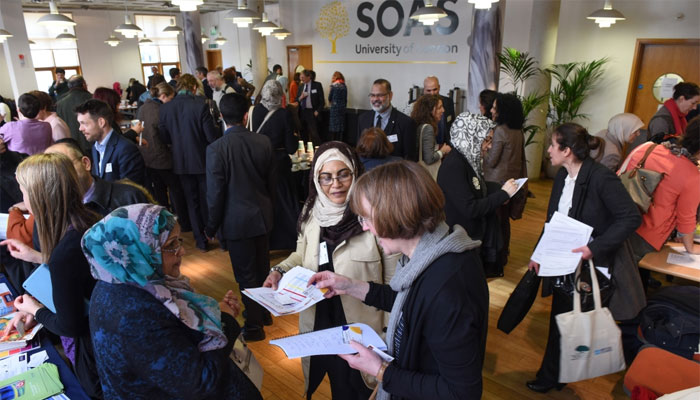By Denise Marray/GT London Correspondent
More than 200 Arabic language teachers, teacher trainers and academics from leading universities gathered in London this week at the School of Oriental and African Studies (SOAS) for the Arabic Language and Culture Conference promoting the teaching and learning of Arabic in the United Kingdom.
What emerged clearly from the presentations, discussion and sharing of expertise is that there is an appetite for learning Arabic among UK students. Data on exam entries shows that demand for ‘A’ level Arabic, introduced in 2002, has more than doubled from around 300 entries to just over 600 in 2014. This contrasts with a national picture of a significant drop in the study of languages which formerly enjoyed a greater uptake. In the same period, for example, French declined by 30% and German by 40%.
British Council research pinpoints Arabic as the second in a list of 10 languages which ‘have the potential to add most value to the UK’s strategic interests’. This finding is stated in its ‘Languages for the Future: Which Languages the UK needs most and Why’ report which concluded that the top 10 desirable languages are Spanish, Arabic, French, Mandarin Chinese, German, Portuguese, Italian, Turkish, Russia and Japanese.
That potential, however, is currently not being realised. UK students are handicapped due to a lack of language learning options, particularly in the state primary and secondary system. It takes time and money to resource language teaching but results can be impressive as the British Council’s drive to promote the take up of Mandarin Chinese has shown.
Qatar Foundation is at the heart of initiatives aimed at building up Arabic language teaching and learning in the UK.
The Arabic language and culture pilot project, launched in 2013 and jointly supported by Qatar Foundation, the British Council and Greater London Authority, is assisting with the provision of proficient Arabic language teachers. The pilot, which also enjoys the backing of SOAS, Goldsmiths College and the University of Edinburgh, has been able to offer seed funding to clusters of schools in Blackburn and Belfast, Bradford, Sheffield, Manchester, London and Devon.
Speaking to Gulf Times after the conference, Martin Hope, British Council country director, Qatar, said: “To start introducing world languages into primary and secondary schools requires a huge investment of time, resources and planning. You have got to have more teachers and more schools that want to teach Arabic.”
He is impressed by the positive response to the pilot project which he hopes will lead to the kind of successes achieved by British Council and HSBC in promoting the teaching of Mandarin Chinese in UK schools. He pointed out the rich variety of resource materials for the teaching of Arabic which schools can access with ease. He noted that there is still lively debate about the merits of teaching Arabic dialects or classical Arabic.
Nasser Al-Khori, of Qatar Foundation/Qatar Foundation International, pointed to the success of US Arabic language programmes and said students in the UK clearly had the motivation to learn the language. “I think there is an interest from students. For British students, having Arabic would open up a lot of career opportunities across the Middle East in business and trade,” he said.
In today’s global market it is widely recognised by governments that it makes sense, not just for commercial, but for cultural and security reasons to equip young people with the linguistic skills to be effective communicators. The British Council points to a famous remark made by Nelson Mandela: “If you talk to a man in a language he understands, that goes to his head. If you talk to him in his own language, that goes to his heart.”

